What Can They See if Someone Use My Apple ID
If you share your iCloud account with someone who wants to buy an app from the Apple Store, you might be concerned that the person who has your Apple ID will be able to see the privacy of any information saved in the iCloud. Then there’s the issue “if someone logs into my iCloud, what can they see?” Continue reading to find out the answer to this question.
Hello, I was wondering whether anyone else had experienced something similar, such as seeing a pop-up stating that someone attempted to enter into my iCloud account. What can someone see if they log into my iCloud account?
You might have shared your Apple ID with a friend, acquaintance, or even someone you don’t know for several reasons, even if you might change your password, but is this 100% safe? Or if your iPhone is stolen, how can a thief unlock a stolen iPhone and log in to your Apple ID?
If you’re in this circumstance, you’re undoubtedly curious about what someone can see if they get into your iCloud account. In this blog, we will answer all of your questions, “What can someone see if they log into my iCloud?” and “Will I be notified if they log into my Apple ID?” Let’s get started!
Also Read: How to Fix Apple ID Locked for Security Reasons >
What Happens if Someone Logged into my Apple ID?
Can someone log into my apple id? Yes, when someone knows your Apple account and password. And, once someone has logged into my apple id, they can see more or less personal privacy, and what will see depends on if someone logs on to your Web Apple ID or an Apple device.
If Someone Has my Apple ID, Can they See my Texts?
If you see the messages that you didn’t send, you need to notice that someone may use your Apple ID. Normally, when someone signs into your Apple ID, your iMessages will not be accessed until the Apple ID is logged on the same Apple device. However, they have the ability to send iMessages with your Apple ID’s name. Therefore, they can see both the text messages and iMessages.
If Someone Has my Apple ID, Can they See my Photos?
When you enable the “iCloud Photos” option, your iPhone photos will be saved in the iCloud and constantly updated. Therefore, anyone who has access to your iCloud account will be able to see all your photos on iCloud. Besides, they can download photos from iCloud and save them to a computer or other devices.
What Others Can they See with my iCloud?
1. Mail:
Someone who has access to your iCloud account and password may also be able to access your emails once you enabled iCloud Mail. Once logged in to the iCloud account, the person should click on the Mail option in the sidebar to access the emails.
2. Contacts:
Someone can view your contact list by using your iCloud account. It may include the information of your friends and families, like numbers, emails, and addresses. And, they can export the contacts list from the iCloud website.
3. Track Your Movement:
The individual will have access to Find My iPhone after logging into iCloud. Find My iPhone allows someone to track all devices that are ever logged in with the same Apple ID. Find My iPhone also can wipe an iPhone remotely.
4. iCloud Drive/Notes/Calendar/Keychain:
Other data kept in the iCloud, such as calendars, documents, notes, presentations built with Keynote online, spreadsheets created with Numbers online, and Reminders, could also be viewed by someone who logs into your iCloud. This information can be accessed via an iOS device or the web.
The trickiest part is that anyone who logs into your iCloud account may also access your Keychain. That is, all of the accounts stored in the Apple ID will be made public.
How Can I Know if Someone Logs into my iCloud?
Yes, you will get a message that says your Apple ID login attempt at a place where did not sign in recently. Sometimes, your device may be locked or placed in Lost Mode for unknown reasons, or there are some charges or purchases that you didn’t make.
When you noticed that, you need to contact Apple Support, or you can find out what devices are logged in to your iCloud account by seeing who is signed into your apple id:
Check the Apple ID devices list on your iPhone:
- Open Settings > click on [your name].
- Scroll down and you can see there is a devices list that has ever logged in with this Apple ID.
- You can click on one of the device names to view the detailed information, which will show you the device model, serial number, OS version, IMEI, and whether the device is trusted. That information may vary depending on iPhone, iPad, iPod, or computer. For example, a Windows PC that logged in to your iCloud account may be shown by model, and Windows version and this device cannot be used to receive Apple ID verification codes. You can choose to remove it from your account if you do not recognize this device.
Check the Apple ID devices list on your Mac:
- Go to Apple menu and click System Preferences.
- Choose Apple ID.
- Also, you can click on one of the device names to view the details.
Besides, you can open iCloud for Windows, or sign in to your Apple ID to check.
- How to Fix: This iPhone is Linked to an Apple ID Issue >
- Steps to Permanently Delete Apple ID with/without Password >
What Can I Do after Someone Used My Apple ID?
If you wish to protect your privacy, below are the three methods you can follow and secure your Apple account. It is possible to delete devices associated with your Apple ID from your iDevice or online at iCloud.com. We’ve outlined the steps below:
1. Remove Someone Associated with My iCloud Account on iPhone
It is impossible to access a list of the devices connected with your Apple ID on your iPad, iPod Touch, or iPhone. However, it is easy to remove an associated device. To remove an iDevice, you must first use the device that you want to remove. We’ve outlined the steps you’ll need to do below:
Step 1: First, launch Settings on your iDevice. Then, select [your name].
Step 2: Choose one associated device that is not mine.
Step 3: Select Remove from account. At the same time, you can change your password to strengthen security.
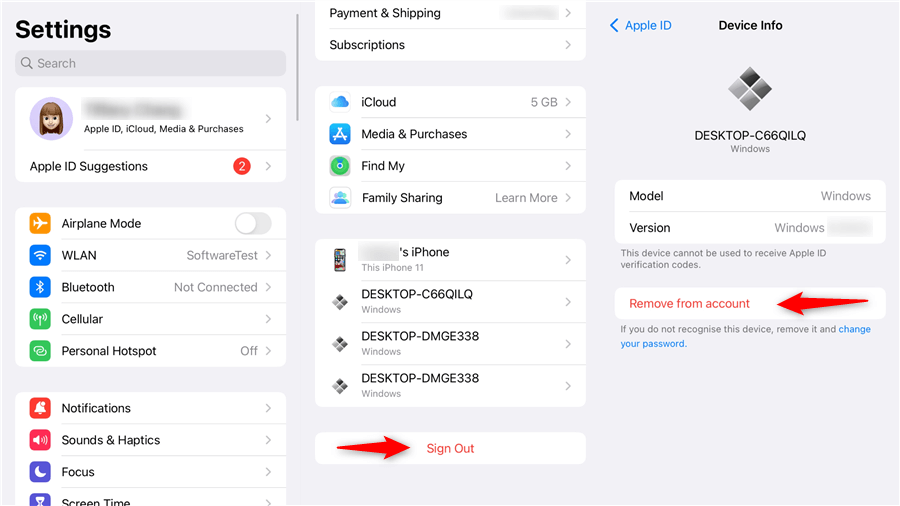
Remove Someone from My Apple ID
2. Remove Someone from iCloud.com
On iCloud.com, you may see a list of the devices associated with your Apple ID. However, the iDevices must be running iOS 8 or later, Mac computers must be running OS X 10.10 or later, and the Apple TV must be of the third generation or later. On iCloud website, you can also see the Apple Watches that are linked to your Apple ID. Follow the procedures below to view and remove these devices:
Step 1: Using a PC web browser, navigate to the iCloud website and then log in with your Apple ID and password.
Step 2: Select My Devices from the Settings menu.
Step 3: A list of the devices that are linked to your Apple ID should appear. Tap on the device you want to uninstall. To remove the device, click the Delete button. If the delete button isn’t present, press Remove Device below the IMEI or a serial number.
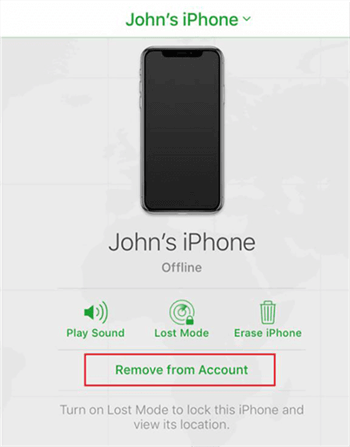
Remove your iPhone from the iCloud Account
3. Change Apple ID When you Forgot Password
If you need to change or reset Apple ID that someone logged in to, but forgot Apple ID or password, you can remove the previous Apple ID without a password. AnyUnlock can help you with that. It is an iPhone password unlocker that enables you to unlock Apple ID without password, bypass iCloud activation lock, bypass MDM lock, unlock screen password, etc.
Here are the main features you can read:
- It supports removing Apple ID without a password.
- Remove iCloud Activation Lock from your iOS devices so you can access the App Store and iTunes Store with another Apple ID.
- It allows you to recover your Apple ID if you have forgotten it.
- Screen password, screen time passcode, and iTunes backup password can also be cracked.
Here is a step-by-step way to remove a previous Apple ID forgot password:
Step 1. On your computer, run AnyUnlock and then tap on Unlock Apple ID.
Free Download * 100% Clean & Safe
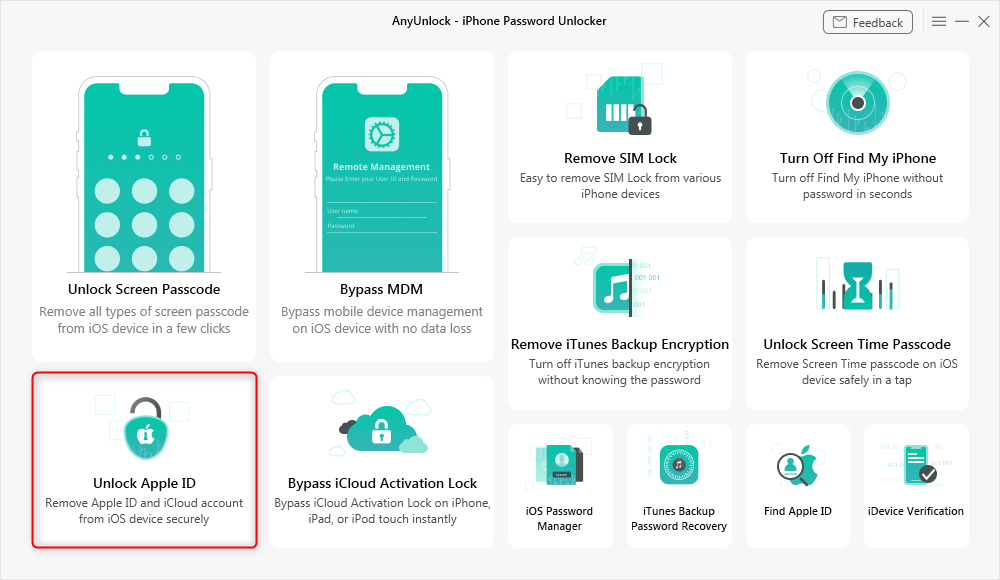
Click Unlock Apple ID from the Homepage
Step 2. Connect your iPhone and click Unlock Now button as below.
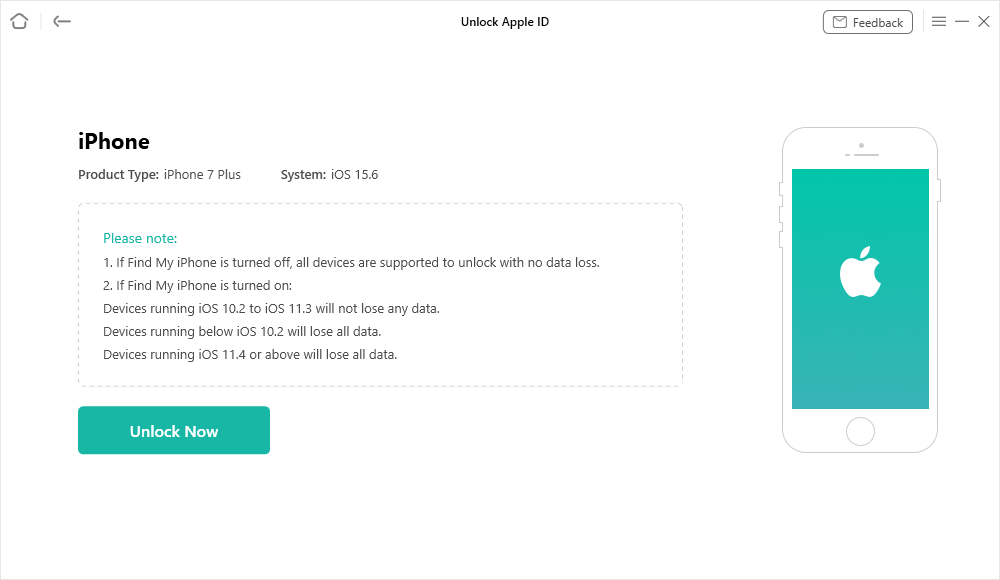
Click Unlock Now Button
Step 3. Apple ID is successfully removed as the below pictures shows. Now, the previous Apple ID is unusable by someone. You can create a new Apple ID on your device.
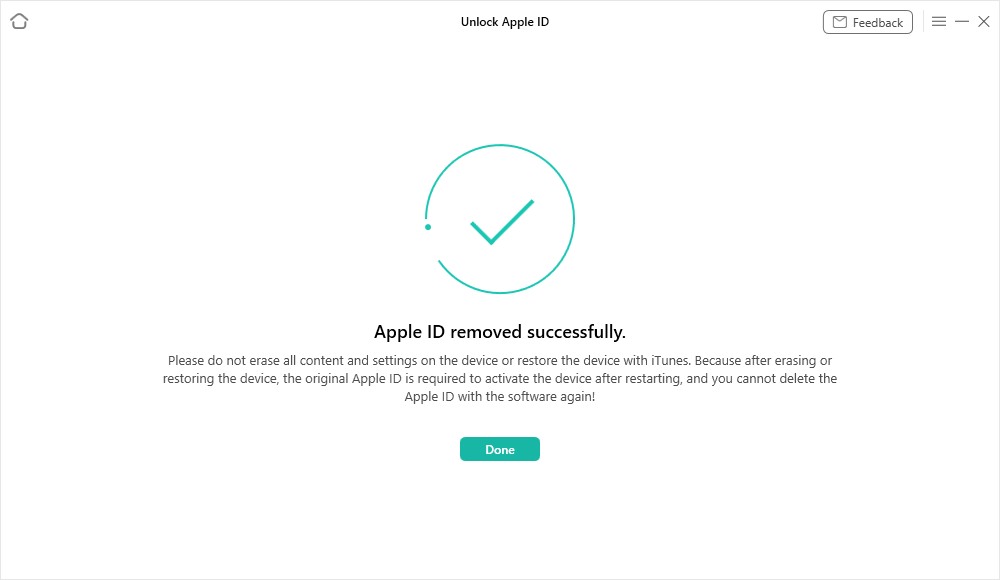
Apple ID Removed Successfully
4. Enable Two-Factor Authentication
If you’ve enabled two-factor authentication (2FA), an unauthorized login is impossible unless they also have access to your other device that allows the verification.
Only if someone knows your Apple ID and password, access to the device that receives the verification code (if you have 2FA enabled), and a device that you previously signed into may they log into your iCloud without your knowledge.
Here’s how to set up two-factor authentication:
A. Turn on two-factor authentication on your iPhone, iPad, or iPod touch
Step 1: First, navigate Settings, click on [your name], and tap on Password & Security.
Step 2: Now click on Turn On Two-Factor Authentication.
Step 3: Next, click on Continue, and enter your phone number, where you would like to get the verification code.
Step 4: Once you get the code, enter it and tap on Next; once verified, the 2FA will be enabled on your device.
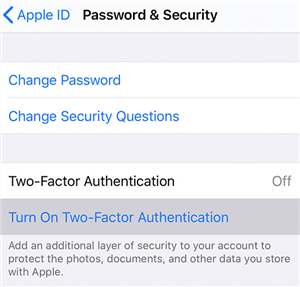
Turn on Two Factor Authentication on iPhone
B. Turn on two-factor authentication on your Mac
Step 1: Select the Apple menu and then tap on System Preferences, then Apple ID.
Step 2: Now tap on Password & Security under your name.
Step 3: Finally, click on the Turn On button near to Two-Factor Authentication.
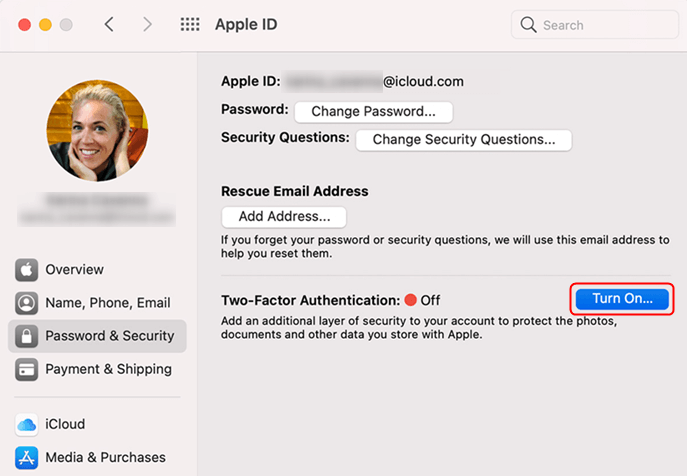
Turn on Two Factor Authentication on Mac
The activation lock feature can lock your smartphone if someone attempts to wipe it and then uses it with their Apple account. The device will continue to prompt for the original owner’s logins, failing which the activation lock will remain in place. To unlock the iCloud activation lock without Apple ID or password, you can also use AnyUnlock.
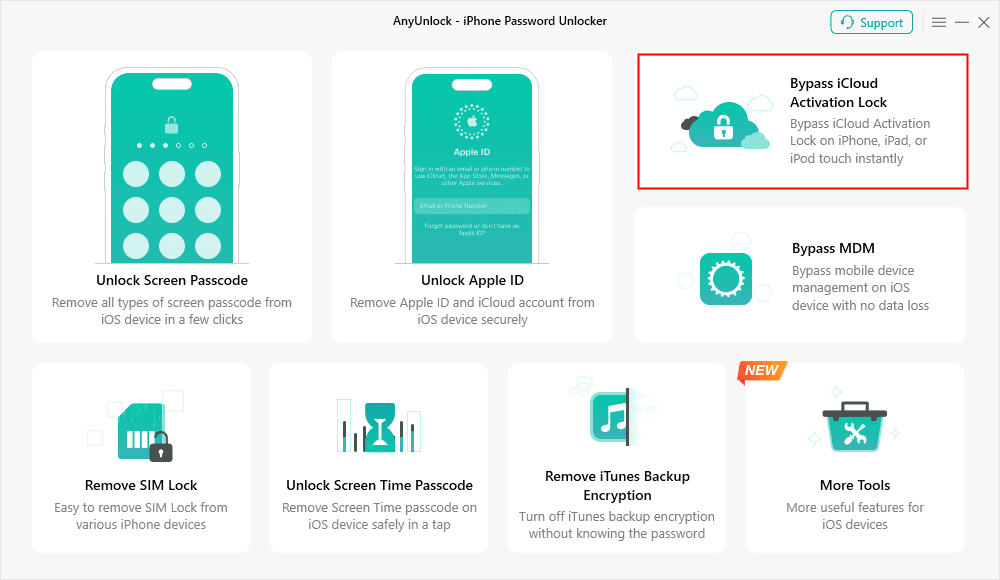
Click on Start Now to Bypass iCloud Activation Lock
How to See Where Your iCloud Account is Signed in
It is possible to see where the Apple ID is being signed in depending on the device.
A.If your iCloud account is active on your iPhone or iPad:
- Navigate to Settings and then click on Your Name.
- Scroll down and click on each Device to see more information.
B. If you have an iCloud account and are logged in to Windows:
- Download and install iCloud for Windows on your computer.
- In the lower-left corner, click Account Details and then tap on Apple ID.
- To view the details, tap on each device.
C. If your iCloud account is logged in on your Mac:
- First, hit on the Apple menu in the upper left corner and select System Preferences.
- The iCloud details window will appear when you click on iCloud and Account Details.
- When you click Devices, you’ll get a list of the linked devices to your iCloud account.
The Bottom Line
That’s All! When someone logs into your iCloud account, they will be able to see and steal your confidential info. If you find out that someone has accessed your iCloud account, the best thing you can do is delete the device from the iCloud account or use 2FA. You may also disable iCloud Activation Lock when you forget your password by utilizing the recommended tool: AnyUnlock – iPhone Unlocker.
More Related Articles
Product-related questions? Contact Our Support Team to Get Quick Solution >

